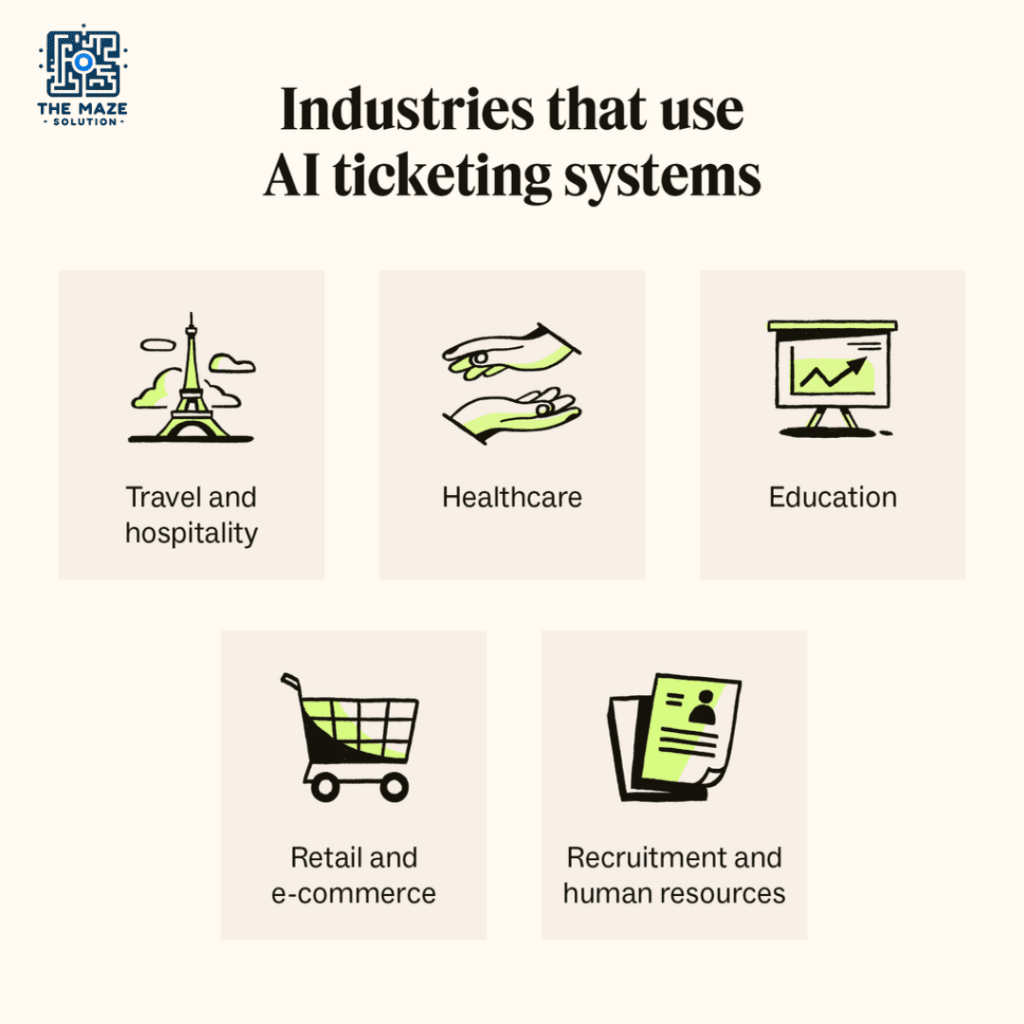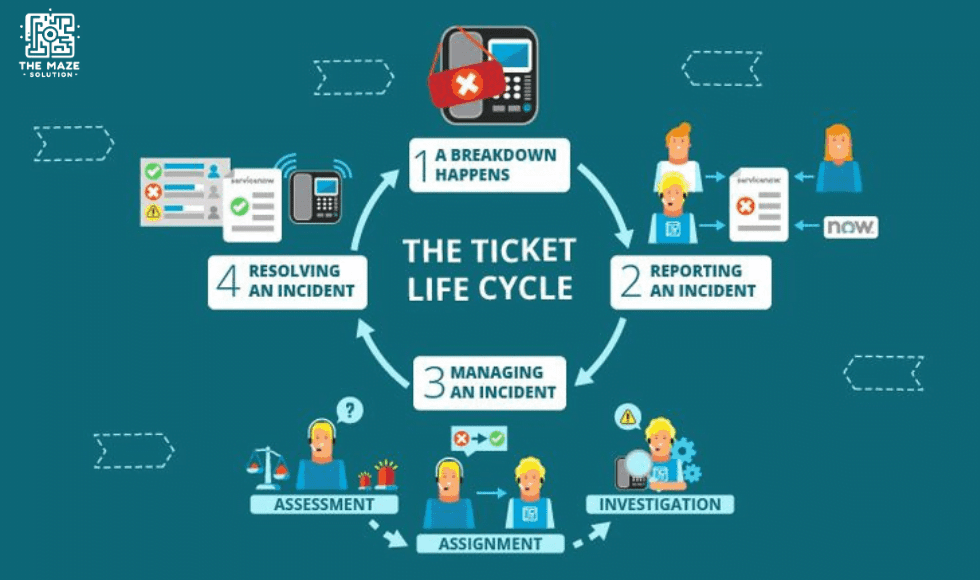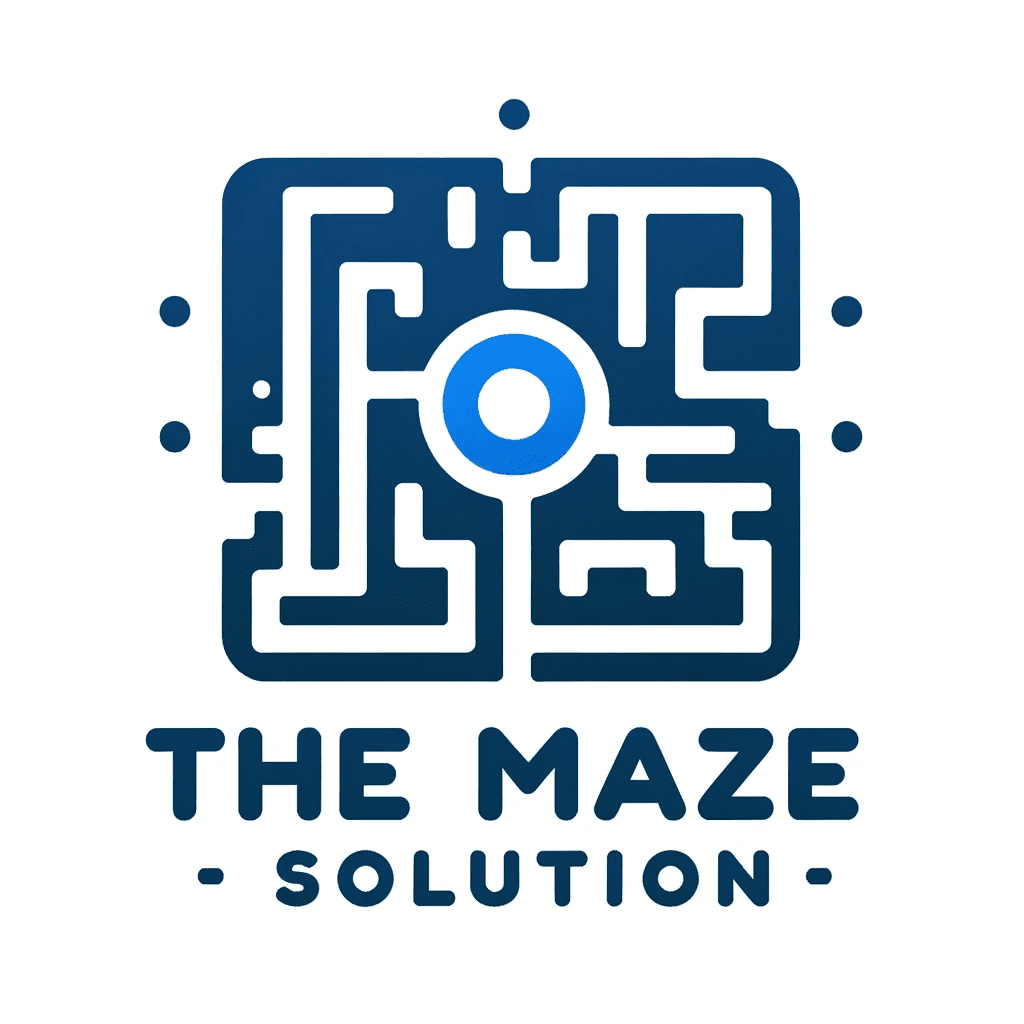Artificial Intelligence Tickets : The Evolution of the Ticketing System

Introduction
Imagine a world where buying tickets for your favorite concert or sports event is as simple as having a conversation with a friend. This isn’t a futuristic dream; it’s happening now, thanks to artificial intelligence (AI). AI is transforming ticketing systems (artificial intelligence tickets), making them more efficient, secure, and personalized than ever before. In this blog post, we’ll explore the evolution of ticketing systems, the benefits of AI-powered ticketing, key technologies, real-world examples, and what the future holds. Whether you’re an AI student, specialist, software engineer, or developer, this comprehensive guide will provide valuable insights into how AI is reshaping the ticketing industry.
History of Ticketing Systems
Early Methods of Ticket Distribution
Ticketing systems have come a long way from the days of physical tickets and box office sales. In the early days, tickets were manually printed and distributed, often leading to long lines and sold-out events. Physical tickets were prone to loss or damage, causing frustration for attendees and event organizers alike.
Introduction of Online Ticketing Platforms
With the advent of the internet, online ticketing platforms began to emerge. Websites like Ticketmaster revolutionized the way people bought tickets, offering the convenience of purchasing from the comfort of their homes. However, these systems had their limitations, such as slow processing times during high-demand periods and vulnerability to scalping.
Limitations of Traditional and Early Online Ticketing Systems
Despite the improvements brought by online ticketing, traditional systems still faced several challenges. Manual processes were time-consuming and error-prone, while the lack of advanced security measures made it easier for fraudsters to exploit the system. Additionally, customer experiences were often impersonal, lacking the tailored recommendations and interactions that modern consumers expect.
The Emergence of AI Ticketing
Definition and Brief Explanation of Artificial Intelligence
Artificial intelligence refers to the simulation of human intelligence in machines, enabling them to perform tasks that typically require human intellect. These tasks include learning, reasoning, problem-solving, and understanding natural language. AI encompasses various technologies like machine learning, natural language processing (NLP), and computer vision.
How AI Started Being Integrated into Ticketing Systems
The integration of AI into ticketing systems began as event organizers sought to address the limitations of traditional methods. By automating processes and leveraging data analytics, AI offered a way to enhance efficiency and improve customer experiences. Early implementations included chatbots for customer support and machine learning algorithms for demand prediction.
The Transition from Manual to Automated Processes
The shift from manual to automated processes was driven by the need for speed, accuracy, and scalability. AI-powered systems could handle large volumes of transactions in real time, reducing wait times and minimizing errors. Automation also allowed for more personalized interactions, as AI could analyze customer data to offer tailored recommendations.
Benefits of artificial intelligence tickets
Efficiency and Speed
One of the most significant advantages of AI-powered ticketing systems is their ability to process ticket sales and distribution quickly. Automated systems can handle thousands of transactions per minute, ensuring a smooth and speedy experience for customers.
Cost Reduction
AI helps reduce operational costs for event organizers by automating routine tasks and minimizing the need for manual labor. This cost-saving aspect makes AI an attractive option for both small and large events.
Scalability
AI-powered ticketing systems are highly scalable, capable of handling large volumes of ticket sales during peak times. This scalability ensures that even major events with high demand can be managed efficiently.
Personalization
AI enables personalized customer experiences by analyzing individual preferences and behaviors. This allows event organizers to offer tailored recommendations, enhancing customer satisfaction and loyalty.
Security
Enhanced security measures are another key benefit of AI-powered ticketing systems. AI can detect and prevent fraud, such as ticket scalping, by analyzing patterns and identifying suspicious activities.
Data Analytics
AI’s ability to analyze customer behavior and sales patterns provides valuable insights for event organizers. These insights can be used to optimize marketing strategies, improve customer experiences, and increase revenue.

Key Technologies in AI Ticketing
1. Machine Learning
Role and Function:
- Prediction of Demand: Machine learning algorithms analyze past event data, social media trends, and other relevant factors to predict the demand for tickets. This helps organizers understand which events are likely to be popular and adjust their strategies accordingly.
- Pricing Optimization: These algorithms can dynamically adjust ticket prices based on real-time demand, competitor pricing, and other market conditions. This ensures that tickets are sold at the optimal price, maximizing revenue for event organizers.
- Trend Identification: By continuously learning from new data, machine learning systems can identify emerging trends and patterns. This information can be used to tailor marketing efforts and improve event planning.
Benefits:
- Informed Decision-Making: Event organizers gain valuable insights that help them make data-driven decisions.
- Increased Revenue: Optimized pricing strategies can lead to higher ticket sales and increased profits.
- Improved Event Planning: Understanding trends helps organizers plan events that meet audience expectations.
2. Natural Language Processing (NLP)
Role and Function:
- Customer Interaction: NLP powers chatbots and virtual assistants, allowing them to understand and respond to customer inquiries in natural language. This interaction can range from answering simple questions to assisting with complex issues.
- Quick and Accurate Responses: These systems provide instant responses, reducing wait times and enhancing the customer experience. They can handle a high volume of queries simultaneously, ensuring efficient support.
Benefits:
- Enhanced Customer Support: Customers receive quick and accurate information, improving their overall experience.
- Operational Efficiency: Automated responses reduce the workload on human support staff, allowing them to focus on more complex tasks.
- Scalability: NLP systems can handle a large number of interactions without additional human resources.
3. Facial Recognition
Role and Function:
- Seamless Entry Experience: Facial recognition technology can quickly and accurately verify attendees’ identities, allowing for a smooth and efficient entry process at events.
- Enhanced Security: By verifying identities, this technology helps prevent unauthorized access, ensuring that only valid ticket holders can enter the event.
Benefits:
- Reduced Wait Times: Attendees can enter events quickly without the need for manual ticket checks.
- Increased Security: The risk of ticket fraud and unauthorized access is minimized.
- Convenient Experience: Attendees enjoy a hassle-free entry process, enhancing their overall event experience.
4. Blockchain Technology
Role and Function:
- Secure Transactions: Blockchain creates a decentralized and tamper-proof record of each ticket transaction. This ensures that tickets cannot be duplicated or altered.
- Transparency: Every transaction is recorded on the blockchain, providing a transparent and auditable trail of ticket sales and transfers.
Benefits:
- Fraud Prevention: The tamper-proof nature of blockchain makes it difficult for scalpers to exploit the ticketing system, reducing the risk of fraud.
- Trust and Transparency: Both event organizers and attendees can trust the integrity of the ticketing process, knowing that transactions are secure and transparent.
- Efficient Transfers: Blockchain technology allows for seamless and secure transfers of tickets between parties.
Case Studies and Examples

Successful AI Integration
One notable example of successful AI integration in ticketing is the use of AI by Ticketmaster. The company implemented machine learning algorithms to predict demand and optimize pricing, resulting in increased revenue and improved customer satisfaction.
Major Events and Companies
The Wimbledon tennis tournament is another excellent example of AI-powered ticketing. By using AI to analyze data and predict demand, Wimbledon can efficiently manage ticket sales and ensure a smooth experience for attendees.
Impact on Customer Satisfaction and Event Management
AI-powered ticketing systems have significantly impacted customer satisfaction and event management. For instance, the Glastonbury Festival reported a 30% increase in customer satisfaction after implementing AI-driven ticketing solutions.
Challenges and Considerations
Privacy Concerns
Handling personal data and ensuring user privacy are significant challenges in AI-powered ticketing systems. Event organizers must comply with data protection regulations and implement robust security measures to protect customer information.
Technical Barriers
Implementing AI technologies in existing systems can be complex and require specialized expertise. Event organizers must invest in the necessary infrastructure and training to overcome these technical barriers.
Resistance to Change
Overcoming skepticism from traditionalists who may be resistant to adopting new technologies is another challenge. Clear communication of the benefits and successful case studies can help address this resistance.
Cost of Implementation
The initial investment and ongoing maintenance costs of AI-powered ticketing systems can be substantial. Event organizers must carefully consider the return on investment and long-term benefits before proceeding.
The Future of AI in Ticketing
Predictions for the Next Decade
In the next decade, AI will continue to shape the ticketing industry, with advancements in machine learning, NLP, and facial recognition driving further innovation. Expect more personalized experiences, enhanced security, and improved efficiency.
Potential Advancements and New Technologies
New technologies, such as augmented reality (AR) and virtual reality (VR), may also play a role in the future of ticketing. These technologies can offer immersive experiences and additional layers of security.
Shaping Customer Experience and Event Management
AI will continue to influence customer experience and event management, providing valuable insights and enabling more efficient operations. Event organizers who adopt AI-driven solutions will have a competitive advantage in the industry.
Conclusion
The evolution of ticketing systems has been marked by significant advancements, with AI playing a crucial role in transforming the industry. From improving efficiency and security to offering personalized experiences, AI-powered ticketing systems provide numerous benefits for both event organizers and attendees. As we look to the future, it’s clear that AI will continue to shape the ticketing landscape, offering exciting possibilities for further innovation.
By understanding the potential of AI and staying informed about the latest developments, event organizers can harness the power of AI to enhance their operations and deliver exceptional customer experiences. If you’re considering integrating AI into your ticketing system, now is the time to start exploring the possibilities and reaping the benefits of this revolutionary technology.
For more insights and resources on AI and ticketing systems, feel free to explore our other articles and share your thoughts and experiences in the comments below. Together, we can shape the future of ticketing and create a more efficient, secure, and enjoyable experience for all.





